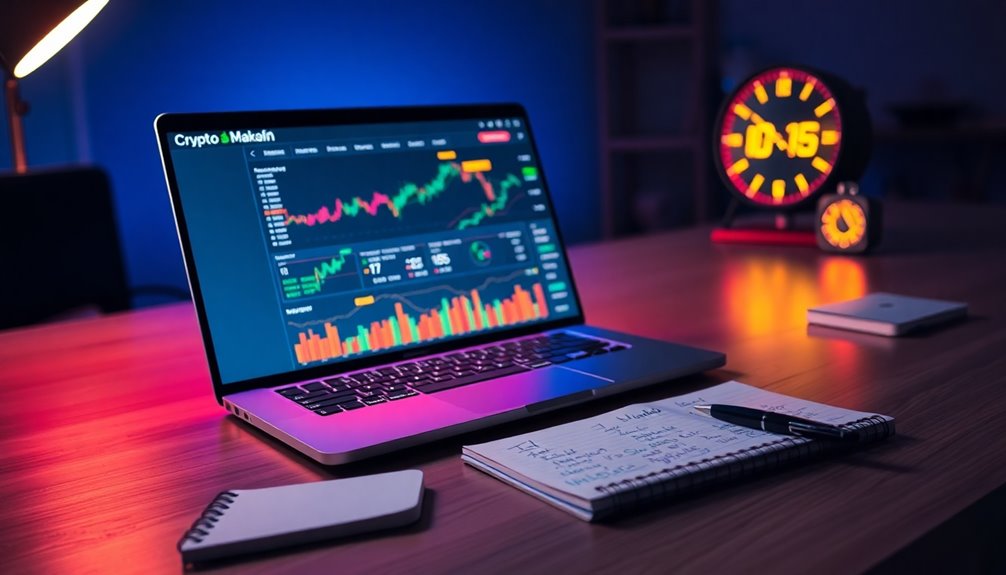To land a job in the hottest crypto startups, you need a clear strategy. First, understand the crypto landscape and keep an eye on trends and major players like Bitcoin and Ethereum. Leverage educational resources, such as online courses and industry podcasts, to build your knowledge. Gain practical experience through personal projects, hackathons, and open-source contributions. Actively network by attending industry events and engaging within online communities. Tailor your job applications to highlight your relevant skills and knowledge of the crypto ecosystem. With the right steps, you're on your way to success in this dynamic field, and there's more to explore ahead.
Key Takeaways
- Build a strong portfolio showcasing relevant projects, skills, and experiences in blockchain and cryptocurrency to attract potential employers.
- Engage in continuous learning through online courses, podcasts, and industry news to stay updated on crypto trends and technologies.
- Network actively by attending industry events, meetups, and online communities to connect with professionals and increase job opportunities.
- Tailor job applications to highlight transferable skills, relevant experiences, and understanding of the crypto ecosystem to stand out to recruiters.
- Gain practical experience by contributing to open-source projects, participating in hackathons, and developing your own DApps or smart contracts.
Understanding the Crypto Landscape

To navigate the rapidly evolving crypto landscape, it's essential to grasp the fundamentals of blockchain technology and its impact on transactions. Blockchain is the backbone of cryptocurrencies, allowing for secure and transparent exchanges without the need for intermediaries. This decentralized nature not only reduces transaction costs but also enhances security and transparency. Moreover, the cryptocurrency market is projected to grow significantly, with an estimated market size of USD 44.29 Billion by 2024.
However, while blockchain offers significant advantages, it also faces limitations, such as scalability issues and energy consumption concerns that need addressing for future growth. Major cryptocurrencies like Bitcoin and Ethereum lead the market, each with unique use cases that set them apart from others. As you delve deeper, you'll notice a rising interest in additional cryptocurrencies like Solana and Polkadot.
Industry trends indicate increasing adoption of digital assets, with financial institutions integrating services for these major cryptocurrencies, enhancing their legitimacy. The growth of decentralized finance (DeFi) and the use of cryptocurrencies in NFTs highlight the expanding applications of blockchain technology. You'll need to stay informed about market dynamics and regulatory changes, as they can significantly impact your approach to landing a job in a crypto startup. Understanding these elements will set a strong foundation for your journey into the crypto world.
Leveraging Educational Resources

In the fast-paced world of crypto startups, leveraging educational resources is crucial for staying ahead. Online platforms like Coursera, Udemy, and edX offer a variety of free and paid courses on blockchain and cryptocurrencies, catering to all skill levels. You can dive into topics like blockchain technology, smart contracts, and crypto economics, often earning certifications upon completion. Tokonomo Academy also provides free courses with comprehensive study guides, while FreeCodeCamp focuses on web3 and blockchain development.
Podcasts and YouTube channels are fantastic for on-the-go learning. "The Pomp Podcast" delivers deep insights into the crypto industry, and channels like "Coin Bureau" offer tutorials and market analyses. These resources keep you updated on trends and practical skills through engaging video content. Participating in programs like the Crypto Startup School can also enhance your understanding of the industry while providing access to funding and mentorship opportunities.
Don't overlook blogs, articles, and whitepapers from sites like CoinDesk and CoinTelegraph, which deliver the latest news and analyses. Reading whitepapers from major projects like Bitcoin and Ethereum can deepen your technical understanding.
Finally, participate in webinars and live streams for real-time insights and Q&A sessions. Engage with online communities on platforms like Reddit and Discord to exchange knowledge and experiences, ensuring you remain informed and relevant in this dynamic field.
Gaining Practical Experience

Gaining practical experience is essential for making a mark in the crypto startup scene. Start by building your own projects—create simple decentralized applications (DApps) and experiment with smart contracts on Ethereum. Focus on one standout project that showcases your skills and interests, and don't forget to feature it on platforms like GitHub. Understanding the importance of community building can also enhance your visibility and connections in the crypto ecosystem.
Participating in blockchain hackathons is another great way to gain hands-on experience. These events allow you to develop solutions to real-world problems under time pressure, exposing you to potential employers while providing valuable feedback from industry professionals.
You can also contribute to open-source projects on GitHub. Seek out crypto projects that align with your expertise and actively engage in improving their repositories. Collaborating with other developers will enhance your skills and display your commitment to the community.
Lastly, immerse yourself in community development. Participate in discussions on platforms like Discord and Telegram, and contribute to relevant Reddit communities. Offer support and guidance to others, and consider organizing or joining local blockchain meetups to further expand your network. Each of these experiences will bolster your profile and prepare you for a career in crypto startups.
Networking Actively

Networking actively is crucial for anyone looking to thrive in the fast-paced world of crypto startups. Start by attending industry events like Consensus 2025 and the Blockchain Futurist Conference. These gatherings let you connect with experts, investors, and like-minded enthusiasts. Don't forget to participate in local meetups and workshops, as they often provide access to potential employers and industry professionals. Engaging in hackathons can also help you gain practical experience while showcasing your skills to potential employers. Additionally, many startups seek candidates who demonstrate a strong understanding of investment strategies, which can set you apart in the hiring process.
Online communities are another great avenue. Join discussions on platforms like Reddit and LinkedIn, and participate in relevant social media groups. By sharing your insights, you can establish thought leadership and build credibility. Utilize Discord and Telegram to tap into vibrant crypto communities. Sustained networking leads to ongoing access to resources and knowledge, making these online interactions even more valuable.
Consider forming strategic alliances with other startups to create innovative solutions and enhance your networking opportunities. Collaborating can increase visibility and attract investors who appreciate teamwork.
Lastly, seek mentorship from experienced professionals in the industry. Building these relationships can provide invaluable guidance and introduce you to potential connections in the crypto world. Remember, effective networking is about building genuine relationships that can lead to exciting opportunities.
Tailoring Job Applications

Tailoring your job applications is essential for standing out in the competitive crypto startup landscape. Start by identifying and emphasizing your transferable skills, such as marketing, programming, or finance, that directly relate to the crypto industry. Highlight any direct experience with blockchain technologies and proficiency in programming languages relevant to the positions you're targeting.
Don't forget to mention your understanding of crypto-economics and the unique culture surrounding the crypto world. If you have experience in similar roles from traditional industries like tech or finance, showcase that too.
Building a strong portfolio is crucial. For technical roles, maintain an active GitHub profile. For non-technical positions, consider writing blog posts or engaging in content creation about crypto. This demonstrates your engagement and expertise. Additionally, remember that remote positions are widely available, allowing you to apply for roles without geographical limitations.
When customizing your resume, focus on direct experience with blockchain and crypto projects. Tailor it to each job by using relevant keywords and highlighting your participation in crypto communities. Also, make sure your resume reflects an understanding of the industry's culture and terminology.
Finally, utilize job boards like CryptoJobsList, where many crypto startups actively recruit talent. This targeted approach will significantly boost your chances of landing an interview.
Preparing for Interviews

When preparing for interviews in the crypto startup space, it's crucial to have a solid grasp of blockchain fundamentals and current industry trends. Start by studying the basics of blockchain technology, including key terms, consensus mechanisms, and cryptographic algorithms. Understand how different blockchain networks operate, along with their benefits and limitations. Familiarize yourself with popular cryptocurrencies and their use cases, and dive into the whitepapers of major projects like Bitcoin and Ethereum for deeper insights. Additionally, be aware of the growing demand for skilled professionals in the crypto industry as it continues to expand.
Gaining practical experience is equally important. Participate in blockchain hackathons, contribute to open-source projects on GitHub, and build your own decentralized applications (DApps) or smart contracts. Engaging in coding challenges specific to blockchain development can enhance your skills.
Research the company thoroughly. Know its mission, products, and any recent announcements. Align your interests with the company's goals and prepare to discuss how you can contribute. Brush up on technical questions related to blockchain, cryptography, and smart contracts, and practice explaining complex concepts simply. Lastly, engage in mock interviews to refine your answers and boost your confidence, ensuring you're ready to impress during the actual interview.
Staying Updated on Trends

After you've honed your interview skills, staying updated on trends in the crypto industry becomes vital for your career growth. You need to regularly follow industry news and updates, so subscribe to newsletters and track thought leaders. This will keep you informed about the latest developments, including regulatory changes and their effects on the market.
Participate in hackathons, meetups, and conferences. These events not only provide insights into technological advances—like AI integration into blockchain—but also help you network with key players in the field. Read comprehensive reports from research firms like Presto Research to gain deeper analytical perspectives. Notably, the approval of spot Bitcoin ETFs has significantly influenced market dynamics and investor interest.
Keep an eye on market trends and forecasts, especially related to Bitcoin and other cryptocurrencies. Understanding the performance of various tokens and the role of decentralized exchanges in price discovery is crucial. Engage with the crypto community through online forums and professional networks. This allows you to share knowledge and gather insights.
Lastly, follow major crypto firms and their strategies to stay ahead of the curve. By staying engaged and informed, you’ll position yourself as a knowledgeable candidate in the competitive crypto job market. As the crypto industry continues to evolve, being aware of the latest trends and developments can help you identify the next huge opportunity. Whether it’s a new technology, a groundbreaking partnership, or a shift in market dynamics, staying ahead of the curve will allow you to position yourself for success in the ever-changing crypto landscape. By actively seeking out information and networking with industry insiders, you can ensure that you are well-prepared to capitalize on the next huge opportunity in the crypto job market. In addition to following major firms, consider attending industry conferences and webinars where you can learn directly from experts and leaders in the field. These events not only provide valuable insights but also open doors for networking with potential employers and collaborators. By immersing yourself in the community and keeping an eye on emerging trends, you’ll be in a prime position to recognize the next crypto opportunity ready to soar, setting yourself apart in a competitive arena. Remember, staying proactive and informed is key to harnessing the potential that lies ahead in this dynamic industry.
Building a Personal Brand

Building a personal brand in the crypto industry is essential for standing out in a competitive job market. Start by creating a strong online presence. Establish a LinkedIn profile to showcase your skills and experiences, and build a professional website to highlight your expertise and projects. Consistency across your online profiles is key to maintaining a cohesive brand image. Use platforms like Twitter to follow industry leaders and share valuable insights.
Participate in online communities related to crypto and Web3 technologies. Engage in discussions to demonstrate your expertise, and attend online events or webinars to expand your network. Contributing to open-source projects on GitHub can also showcase your skills effectively. Digital identity is critical for establishing trust within these communities, enhancing your personal brand's credibility.
Building a portfolio is crucial. Include examples of your work, previous job experiences, and any accolades you've received in the crypto field. Highlight personal projects that display your proficiency in relevant programming languages or tools.
Finally, immerse yourself in networking. Attend industry events and conferences to meet professionals, and engage in meaningful conversations to build connections. Following and interacting with industry leaders not only keeps you informed but also positions you as an active participant in the crypto community.
Exploring Remote Opportunities

Navigating the world of remote opportunities in the crypto industry can be both exciting and lucrative. With nearly 190,000 people working in this sector, a significant number are employed remotely to cut costs. Many crypto companies, like OpenZeppelin and Gemini, have adopted global employment strategies, allowing you to explore diverse roles such as Backend Developer, Cryptocurrency Analyst, or Blockchain Developer from anywhere.
Salaries for remote crypto jobs vary widely, with Blockchain Developers earning around $123,000 per year in the US. On average, roles in Blockchain/Cryptocurrency startups offer around $90,917 annually, while top-paying positions can reach up to $170,000. Key skills in demand include Go, PostgreSQL, Kubernetes, and experience with blockchain protocols. Chief Marketing Officers are also in high demand as companies look to reshape their narratives and engage with their audiences effectively.
Major companies like Binance and Uniswap Labs are frequently hiring remotely, primarily in North America and Europe. If you're located in India or China, you'll find significant opportunities, too, despite regulatory hurdles. By focusing on the right skills and targeting these companies, you can tap into a thriving, remote work environment in the crypto industry, positioning yourself for both professional growth and financial success.
Continuous Skill Development

Continuous skill development is essential in the fast-paced crypto industry, where technology and trends evolve rapidly. To stay competitive, you need to grasp the fundamentals of blockchain technology, including its benefits and limitations. Dive into whitepapers from successful projects like Bitcoin and Ethereum to deepen your understanding. Understanding the fundamentals of blockchain technology will provide you with a solid foundation for navigating this complex field.
Gaining practical experience is equally crucial. Participate in blockchain hackathons to apply your knowledge and connect with potential employers. Contributing to open-source projects on GitHub or building your own decentralized applications (DApps) can showcase your skills effectively. Keep a portfolio of your projects to highlight your hands-on experience.
Networking is another critical component. Attend local meetups and major conferences like Consensus to engage with industry leaders. Actively participate in discussions on social media platforms and join communities on Discord and Telegram to expand your network.
Finally, commit to continuous learning. Stay updated on new cryptocurrencies and technological advancements, and consider learning additional programming languages or project management skills. Seek mentorship from experienced professionals for guidance, and participate in training sessions focused on current industry trends. By consistently developing your skills, you'll position yourself for success in the dynamic crypto landscape.
Frequently Asked Questions
What Are the Common Job Roles in Crypto Startups?
In crypto startups, you'll find a mix of technical and non-technical job roles. Technical roles include Blockchain Developers, who build and maintain blockchains, and Data Scientists, who analyze market trends. Non-technical positions like Marketing Managers and Community Managers focus on engagement and brand strategy. Each role demands specific skills, whether it's coding or communication. By understanding these roles, you can better position yourself for opportunities in this dynamic industry.
How Can I Evaluate a Crypto Startup's Credibility?
To evaluate a crypto startup's credibility, start by assessing the team's experience and track record. Look for transparency and a cohesive working environment among the founders. Next, analyze the market size, customer engagement, and competitive landscape to gauge viability. Review financial projections and third-party audits for transparency. Lastly, check media coverage, community support, and endorsements to ensure the startup has a solid reputation in the industry.
What Soft Skills Are Essential for Crypto Industry Roles?
In the crypto industry, essential soft skills include adaptability, effective communication, and problem-solving. You'll need to clearly convey complex ideas to diverse audiences while remaining open to feedback. Collaboration is key, as you often work with varied teams. Creative thinking helps you tackle unique challenges, while critical thinking aids in making informed decisions. Lastly, understanding regulatory compliance and market trends enhances your ability to contribute meaningfully in this evolving landscape.
How Do I Negotiate Salary in the Crypto Sector?
To negotiate salary in the crypto sector, start by researching market trends and specific company compensation models. Highlight your unique skills and experiences, demonstrating the value you bring. Be prepared to discuss performance bonuses and flexible benefits. Approach negotiations collaboratively, and don't hesitate to state your salary expectations clearly. Remember, it's okay to walk away if the terms aren't right for you; future opportunities may arise.
What Should I Include in My Crypto Portfolio?
When building your crypto portfolio, make sure to diversify across various digital assets. Include major cryptocurrencies like Bitcoin and Ethereum for stability, alongside established altcoins such as Binance Coin and Cardano. Don't forget to explore different sectors, like DeFi and NFTs. Balance your investments between large-cap and small-cap coins, and consider allocating portions for both long-term holding and short-term trading strategies to optimize returns while managing risk.
Conclusion
To land a job in the hottest crypto startups, you need to stay proactive and adaptable. Embrace continuous learning, network with industry peers, and tailor your applications to stand out. Don't forget to build your personal brand and showcase your skills through practical experience. By keeping up with trends and exploring remote opportunities, you'll position yourself as a strong candidate. Dive in, stay curious, and you'll crack the code to your dream job in the crypto space!









